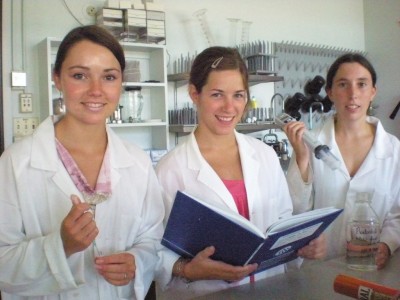Down Under to discover health benefits of food
Queensland Government
Department of Employment, Economic Development and Innovation
Media Release
13 January 2010

Mallory, Anouk and Elodie are three French students studying food science at DEEDI’s Hamilton Research Station
You’d expect a long itinerary for young adventurers to Australia, but three French students have their sights set on attractions beyond the Sydney Harbour Bridge.
Mallory Le Boulanger, Elodie Le Roux and Anouk Besson are on industry placements at the Department of Employment, Economic Development and Innovation’s (DEEDI) Hamilton Research Station, hoping to help uncover the health benefits of selected fruits, vegetables and nuts.
DEEDI biochemist Dr Kent Fanning said the students had been working on interesting projects to enrich their knowledge of ‘functional foods’.
“Mallory is working as part of a team to analyse carotenoids in Queensland vegetables, fruits and nuts,” he said.
“Carotenoids are a class of naturally occurring pigments that may increase the health benefits gained from the foods in which they are contained.
“Significant consumption of carotenoids has been associated with reduced incidence of a variety of cancers, heart disease and certain eye conditions.”
Elodie is part of a team developing methods for the extraction of a particular phytochemical (naturally occurring compound in plants), Camptothecin, from plant material.
Camptothecin is already registered for clinical use in the treatment of a range of cancers.
Anouk is working on a project to separate bioactive (extra-nutritional) compounds from tropical juices, such as plum, to incorporate them into value-added, premium-quality health drinks, food supplements and nutraceuticals.
Dr Fanning said the students were all undertaking degrees in food processing at the Institut National Superieur de Formation Agroalimentaire in Rennes, France.
“This training is a requirement of their course where a laboratory research project has to be undertaken in an organisation abroad to improve English language skills and to learn about project organisation,” Dr Fanning said.
“They have been with us since September last year and will finish up with us here this month.”
Mallory said she was intrigued by DEEDI’s Innovative Food Technologies unit because of the potential to learn more about food’s ability to balance health.
“I am interested in working in the area of health and dietary intake, and I feel the projects on vegetables’ properties against obesity, or zeaxanthin from corn to protect age-related macula degeneration, can teach me a lot,” she said.
“Moreover, it is a safe structure for me to do my practice here. Training abroad for foreign students is not always easy.
“Most of the time, units accept you but don’t give you responsibility. Here, I feel they want to teach me something. I have a real project and some results to achieve. I have an aim to motivate me.
“Previous students in my school have been working at Primary Industries and Fisheries and that made us want to come here.
“They spoke about projects that were interesting, and the staff created a good working atmosphere.
“Thus, I could associate my two aims: doing an attractive training course whilst discovering an unknown country.”
For more information on DEEDI’s research into the potential health benefits of functional foods visit http://www.deedi.qld.gov.au
.